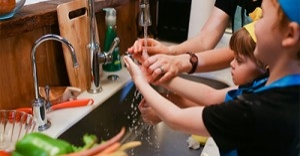

Children love being barefoot! It's comfortable and it enables them to feel free. Feeling the freedom of their movements allows them to feel more liberated. The following article provides information on the Benefits Of Being Barefoot, Safety Considerations and Strategies To Get Started.
Progressive mealtimes are giving an opportunity for children to choose when they want to eat within a certain timeframe instead of eating at a set time. The following article provides information on the Benefits of Progressive Mealtimes, Drawbacks, Strategies and Ideas On Implementing Progressive Mealtimes and more.
Celebrating children's birthdays is important to the child and their families. The following article provides information on Ideas To Celebrate Birthdays In Early Childhood, Healthier Food Options For Birthdays and more.
A calm down box has a variety of sensory tools that a child is encouraged to use when they are feeling frustrated, intense anger to calm-down emotions.The following article provides a list of self-regulates that can be included inside a calm down box.
There are 6 different types of play that children participate in over the course of their development.
The aim of environmental cleaning is to minimise the number of germs to reduce the spread of infection, that survive on surfaces in the education and care service.
One of the biggest hazards we face as early childhood Educators is back injuries. The amount of times we bend, stretch, and lift throughout the day is endless and this can put a strain on your back, causing serious long-term injuries. The following article provides information on Back Risks, Prep Before The Day, Strategies To Support Back Care Throughout The Day and more.
For Educators, one of the hardest tasks is getting children to listen. It may be easier for some but for others (especially Educators who are casual) it can be difficult to get the children to pay attention and to listen to your instructions.
On Thursday 19 May Educators, Teachers and Children have the opportunity to try learning outside the classroom as we celebrate Outdoor Classroom Day. Outdoor Classroom Day is a global campaign to celebrate and inspire outdoor learning and play. On the day, thousands of schools around the world take lessons outdoors and prioritise playtime.
As Educators working with children, it's important to understand each theoretical approach and use parts of different theorists in context. Each theorist’s ideas are independent of the other, but when put together, they give us a good overall understanding of how children develop as they age. The following is an overview of popular child theorists, a brief description of their theories and how to implement their theories into practice within the early childhood environment.
 As of 2024–2025, new national regulations across Australia have significantly tightened restrictions on smoking and vaping in and around early childhood education and care (ECEC)… Read More
As of 2024–2025, new national regulations across Australia have significantly tightened restrictions on smoking and vaping in and around early childhood education and care (ECEC)… Read More
 The Australian Government Department of Education has engaged ORIMA Research to conduct an online ECEC Staff Survey. By collecting this data over time, the Department… Read More
The Australian Government Department of Education has engaged ORIMA Research to conduct an online ECEC Staff Survey. By collecting this data over time, the Department… Read More
 Australian Food Safety Week offers a vital opportunity to embed safe food practices into early learning environments. This year’s theme invites educators and children to… Read More
Australian Food Safety Week offers a vital opportunity to embed safe food practices into early learning environments. This year’s theme invites educators and children to… Read More
© 2009-2025 Aussie Childcare Network Pty Ltd. All Rights Reserved.

